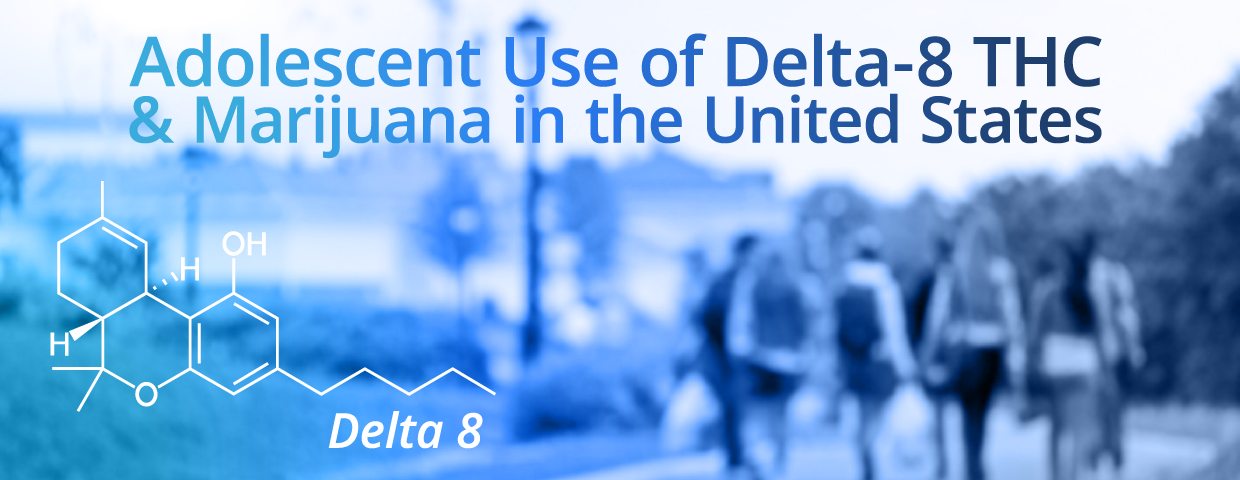
Adolescent Use of Delta-8 THC and Marijuana in the United States
- A 2023 Monitoring the Future survey, published in March 2024, revealed that 11% of 12th-grade students across the United States reported using Delta-8 Tetrahydrocannabinoid (Delta-8 THC)1. This survey is funded by the National Institutes of Health (NIH).
- Use of psychoactive cannabis products is higher in states that do not have Delta-8 or cannabis legalization1.
Difference between Delta-9 and Delta-8 THC
United States federal law dictates that legal hemp-based cannabis products must contain less than 0.3% Delta-9 Tetrahydrocannabinol (the psychoactive ingredient in cannabis). Delta-8 THC is a positional isomer of Delta-9 THC which may elicit psychoactive properties similar to those of Delta-9 THC. Hemp-based products containing higher levels of Delta-8 THC are manufactured and consumed with increasing frequency by consumers2. Traditional screening and confirmation tests do not distinguish Delta-8 THC from Delta-9 THC.
Delta-8 THC Being Marketed Towards Adolescents
Manufacturers are increasing their marketing and sales tactics directed to adolescents with claims that Delta-8 THC products are legal and comparable to marijuana1. Delta-8 Tetrahydrocannabinoid (Delta-8 THC) is legal at the federal level; but it is not legal in every state. Delta-9 Tetrahydrocannabinoid (Delta-9 THC) is illegal at the federal level; but it is legal in more than 50% of states3. Manufacturers create Delta-8 THC products that are primarily aimed at adolescents in the form of gummies, flavored vaping devices, candy, etc., and these products are easily accessible to teens1.
Surveys and Studies into Delta-8 THC
Numerous studies have found that adolescent cannabis use is associated with adverse effects on learning, memory, and attention4. Changes in brain development and the development of cannabis use disorder along with other psychiatric disorders such as depression, psychosis and suidicality have been observed4.
Survey Objective and Design1
NIH sought to gather the self-reported prevalence of use, the sociodemographics of users, and the policy factors affecting use among adolescents in the United States. A randomly selected subset of 12th-grade students in 27 states participated in the survey between February and June 2023.
Survey Demographics1
The sample of 2,186 12-th grade students yielded the following demographics:
- Mean Age: 17.7 years
- Female: 48.9%, Male: 45.8%, Undetermined Gender: 5.3%
- Ethnicity:
- 1% Black
- 5% Hispanic
- 1% White
- 2% Multiracial
- 0% Asian
- 1% Other
- 7% had a parent with a college degree.
- Reported residence in the U.S.:
- 7% South
- 5% West
- 0% Midwest
- 9% Northeast
- 2% lived in states with adult-use marijuana legalization.
- 8% lived in states with Delta-8 THC regulations.
Survey Results1
- 4% (n = 295) self-reported use of Delta-8 THC in the past 12 months with 35.4% (n = 104) of self-reported cases used >10 times in the past 12 months.
- 4% self-reported use of marijuana.
- Delta-8 THC prevalence was higher in the South and Midwest states.
- Delta-8 THC prevalence was higher in states without legal adult-use marijuana or Delta-8 THC regulations. However, marijuana use prevalence did not differ by cannabis policies.
- Delta-8 THC prevalence was lower among Hispanic than White respondents.
- Prevalence of Delta-8 THC and marijuana use did not differ by gender or the level of parental education.
Conclusion
Delta-8 THC prevalence is substantial among US adolescents1. Many people use products containing Delta-8 THC due to their easy accessibility and claims to treat a variety of maladies2. However, using these products can cause a presumptive positive result on a THC drug test, even though the person has not used Delta-9 THC. Prioritizing surveillance, policy, and public heath efforts addressing adolescent Delta-8 THC use may be warranted1.
DTPM Solutions
To resolve the conflicting screening and confirmatory test results and to determine the actual cause of a presumptive positive THC test, DTPM offers the availability of LC-MS/MS confirmatory testing that will differentiate metabolites of Delta-8 THC and Delta-9 THC and determine their concentration in urine samples. Simply order the Delta-8/9 Confirmation Panel via the Phoenix Laboratory Information Management software. If you do not have Phoenix software, please contact us at help@dtpm.com for assistance.
- AF Harlow, et al. Adolescent Delta-8-THC and Marijuana Use in the United States. JAMA. DOI:10.1001/jama.2024.0865 (2024). https://jamanetwork.com/journals/jama/article-abstract/2816083#:~:text=Findings%20In%20this%20nationally%20representative,or%20%CE%948%2DTHC%20regulations.
- https://www.fda.gov/consumers/consumer-updates/5-things-know-about-delta-8-tetrahydrocannabinol-delta-8-thc
- https://www.cdc.gov/marijuana/featured-topics/what-we-know-about-marijuana.html
- https://nida.nih.gov/publications/research-reports/marijuana/what-are-marijuanas-long-term-effects-brain
